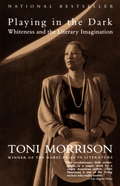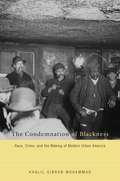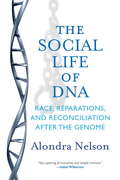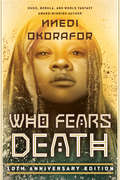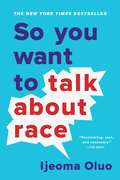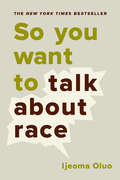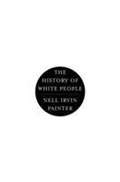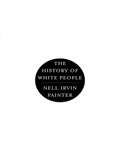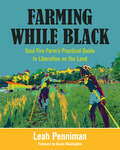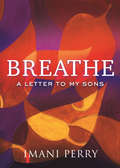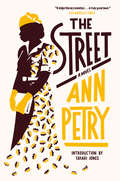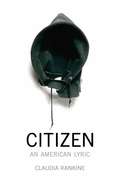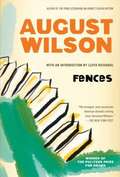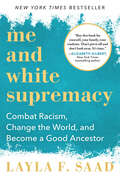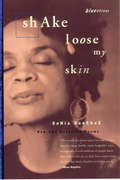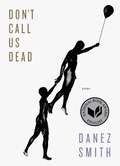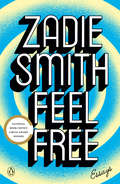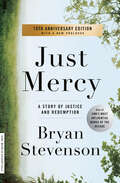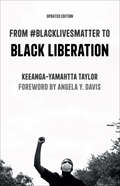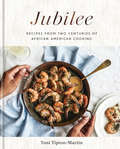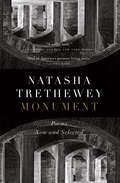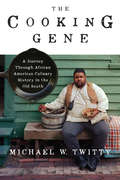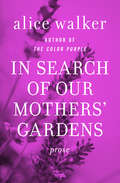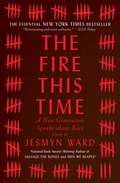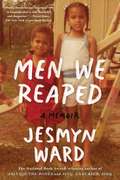Special Collections
Black Liberation Reading List
- Table View
- List View
Playing in the Dark
by Toni MorrisonThe Pulitzer Prize-winning author of Beloved and Jazz now gives us a learned, stylish, and immensely persuasive work of literary criticism that promises to change the way we read American literature even as it opens a new chapter in the American dialogue on race.
Toni Morrison's brilliant discussions of the "Africanist" presence in the fiction of Poe, Melville, Cather, and Hemingway leads to a dramatic reappraisal of the essential characteristics of our literary tradition. She shows how much the themes of freedom and individualism, manhood and innocence, depended on the existence of a black population that was manifestly unfree--and that came to serve white authors as embodiments of their own fears and desires.
Written with the artistic vision that has earned Toni Morrison a pre-eminent place in modern letters, Playing in the Dark will be avidly read by Morrison admirers as well as by students, critics, and scholars of American literature.
The Condemnation of Blackness
by Khalil Gibran MuhammadLynch mobs, chain gangs, and popular views of black southern criminals that defined the Jim Crow South are well known. We know less about the role of the urban North in shaping views of race and crime in American society. Following the 1890 census, the first to measure the generation of African Americans born after slavery, crime statistics, new migration and immigration trends, and symbolic references to America as the promised land of opportunity were woven into a cautionary tale about the exceptional threat black people posed to modern urban society. Excessive arrest rates and overrepresentation in northern prisons were seen by many whites—liberals and conservatives, northerners and southerners—as indisputable proof of blacks’ inferiority. In the heyday of “separate but equal,” what else but pathology could explain black failure in the “land of opportunity”? The idea of black criminality was crucial to the making of modern urban America, as were African Americans’ own ideas about race and crime. Chronicling the emergence of deeply embedded notions of black people as a dangerous race of criminals by explicit contrast to working-class whites and European immigrants, this fascinating book reveals the influence such ideas have had on urban development and social policies.
The Social Life of DNA
by Alondra NelsonThe unexpected story of how genetic testing is affecting race in AmericaWe know DNA is a master key that unlocks medical and forensic secrets, but its genealogical life is both revelatory and endlessly fascinating. Tracing genealogy is now the second-most popular hobby amongst Americans, as well as the second-most visited online category. This billion-dollar industry has spawned popular television shows, websites, and Internet communities, and a booming heritage tourism circuit.The tsunami of interest in genetic ancestry tracing from the African American community has been especially overwhelming. In The Social Life of DNA, Alondra Nelson takes us on an unprecedented journey into how the double helix has wound its way into the heart of the most urgent contemporary social issues around race.For over a decade, Nelson has deeply studied this phenomenon. Artfully weaving together keenly observed interactions with root-seekers alongside illuminating historical details and revealing personal narrative, she shows that genetic genealogy is a new tool for addressing old and enduring issues. In The Social Life of DNA, she explains how these cutting-edge DNA-based techniques are being used in myriad ways, including grappling with the unfinished business of slavery: to foster reconciliation, to establish ties with African ancestral homelands, to rethink and sometimes alter citizenship, and to make legal claims for slavery reparations specifically based on ancestry.Nelson incisively shows that DNA is a portal to the past that yields insight for the present and future, shining a light on social traumas and historical injustices that still resonate today. Science can be a crucial ally to activism to spur social change and transform twenty-first-century racial politics. But Nelson warns her readers to be discerning: for the social repair we seek can't be found in even the most sophisticated science. Engrossing and highly original, The Social Life of DNA is a must-read for anyone interested in race, science, history and how our reckoning with the past may help us to chart a more just course for tomorrow.From the Hardcover edition.
Who Fears Death
by Nnedi OkoraforInternational award-winning Nnedi Okorafor enters the world of magical realist literature with a powerful story of genocide in the far future and the woman who reshapes her world.
In a post-apocalyptic Africa, the world has changed in many ways, yet in one region genocide between tribes still bloodies the land. A woman who has survived the annihilation of her village and a terrible rape by an enemy general wanders into the desert hoping to die. Instead, she gives birth to an angry baby girl with hair and skin the color of sand. Gripped by the certainty that her daughter is different--special--she names her Onyesonwu, which means "Who fears death?" in an ancient language. It doesn't take long for Onye to understand that she is physically and socially marked by the circumstances of her violent conception.
She is Ewu--a child of rape who is expected to live a life of violence, a half-breed rejected by both tribes. But Onye is not the average Ewu. Even as a child, she manifests the beginnings of a remarkable and unique magic. As she grows, so do her abilities, and during an inadvertent visit to the spirit realm she learns something terrifying: Someone powerful is trying to kill her.
Desperate to elude her would-be murderer and to understand her own nature, she embarks on a journey in which she grapples with nature, tradition, history, true love, and the spiritual mysteries of her culture, and ultimately teaches her why she was given the name she bears: Who Fears Death.
So You Want to Talk About Race
by Ijeoma OluoIn this New York Times bestseller, Ijeoma Oluo offers a hard-hitting but user-friendly examination of race in America
Widespread reporting on aspects of white supremacy--from police brutality to the mass incarceration of Black Americans--has put a media spotlight on racism in our society. Still, it is a difficult subject to talk about. How do you tell your roommate her jokes are racist? Why did your sister-in-law take umbrage when you asked to touch her hair--and how do you make it right? How do you explain white privilege to your white, privileged friend?
In So You Want to Talk About Race, Ijeoma Oluo guides readers of all races through subjects ranging from intersectionality and affirmative action to "model minorities" in an attempt to make the seemingly impossible possible: honest conversations about race and racism, and how they infect almost every aspect of American life.
A New York Times Bestseller
So You Want to Talk About Race
by Ijeoma OluoIn this breakout book, Ijeoma Oluo explores the complex reality of today's racial landscape--from white privilege and police brutality to systemic discrimination and the Black Lives Matter movement--offering straightforward clarity that readers need to contribute to the dismantling of the racial divide
In So You Want to Talk About Race, Editor at Large of The Establishment Ijeoma Oluo offers a contemporary, accessible take on the racial landscape in America, addressing head-on such issues as privilege, police brutality, intersectionality, micro-aggressions, the Black Lives Matter movement, and the "N" word. Perfectly positioned to bridge the gap between people of color and white Americans struggling with race complexities, Oluo answers the questions readers don't dare ask, and explains the concepts that continue to elude everyday Americans.
Oluo is an exceptional writer with a rare ability to be straightforward, funny, and effective in her coverage of sensitive, hyper-charged issues in America. Her messages are passionate but finely tuned, and crystalize ideas that would otherwise be vague by empowering them with aha-moment clarity. Her writing brings to mind voices like Ta-Nehisi Coates and Roxane Gay, and Jessica Valenti in Full Frontal Feminism, and a young Gloria Naylor, particularly in Naylor's seminal essay "The Meaning of a Word."
The History of White People
by Nell Irvin PainterEver since the Enlightenment, race theory and its inevitable partner, racism, have followed a crooked road, constructed by dominant peoples to justify their domination of others. Filling a huge gap in historical literature that long focused on the non-white, eminent historian Nell Irvin Painter guides us through more than two thousand years of Western civilization, tracing not only the invention of the idea of race but also the frequent worship of "whiteness" for economic, social, scientific, and political ends. Our story begins in Greek and Roman antiquity, where the concept of race did not exist, only geography and the opportunity to conquer and enslave others. Not until the eighteenth century did an obsession with whiteness flourish, with the German invention of the notion of Caucasian beauty. This theory made northern Europeans into "Saxons," "Anglo-Saxons," and "Teutons," envisioned as uniquely handsome natural rulers. Here was a worldview congenial to northern Europeans bent on empire. There followed an explosion of theories of race, now focusing on racial temperament as well as skin color. Spread by such intellectuals as Madame de Stael and Thomas Carlyle, white race theory soon reached North America with a vengeance. Its chief spokesman, Ralph Waldo Emerson, did the most to label Anglo-Saxons-icons of beauty and virtue-as the only true Americans. It was an ideal that excluded not only blacks but also all ethnic groups not of Protestant, northern European background. The Irish and Native Americans were out and, later, so were the Chinese, Jews, Italians, Slavs, and Greeks-all deemed racially alien. Did immigrations threaten the very existence of America? Americans were assumed to be white, but who among poor immigrants could become truly American? A tortured and convoluted series of scientific explorations developed-theories intended to keep Anglo-Saxons at the top: the ever-popular measurement of skulls, the powerful eugenics movement, and highly biased intelligence tests-all designed to keep working people out and down. As Painter reveals, power-supported by economics, science, and politics-continued to drive exclusionary notions of whiteness until, deep into the twentieth century, political realities enlarged the category of truly American. A story filled with towering historical figures, The History of White People forcefully reminds us that the concept of one white race is a recent invention. The meaning, importance, and realty of this all-too-human thesis of race have buckled under the weight of a long and rich unfolding of events.
The History of White People
by Nell Irvin PainterA New York Times bestseller: "This terrific new book . . . [explores] the 'notion of whiteness,' an idea as dangerous as it is seductive."--Boston Globe Telling perhaps the most important forgotten story in American history, eminent historian Nell Irvin Painter guides us through more than two thousand years of Western civilization, illuminating not only the invention of race but also the frequent praise of "whiteness" for economic, scientific, and political ends. A story filled with towering historical figures, The History of White People closes a huge gap in literature that has long focused on the non-white and forcefully reminds us that the concept of "race" is an all-too-human invention whose meaning, importance, and reality have changed as it has been driven by a long and rich history of events.
Farming While Black
by Leah PennimanRecipient of the 28th Heinz Awards for the Economy: Leah PennimanJames Beard Foundation Leadership Award 2019: Leah PennimanChoice Reviews, Outstanding Academic Title&“An extraordinary book…part agricultural guide, part revolutionary manifesto.&”—VOGUENamed a &“Best Book on Sustainable Living and Sustainability&” by Book RiotIn 1920, 14 percent of all land-owning US farmers were black. Today less than 2 percent of farms are controlled by black people—a loss of over 14 million acres and the result of discrimination and dispossession. While farm management is among the whitest of professions, farm labor is predominantly brown and exploited, and people of color disproportionately live in &“food apartheid&” neighborhoods and suffer from diet-related illness. The system is built on stolen land and stolen labor and needs a redesign.Farming While Black is the first comprehensive &“how to&” guide for aspiring African-heritage growers to reclaim their dignity as agriculturists and for all farmers to understand the distinct, technical contributions of African-heritage people to sustainable agriculture. At Soul Fire Farm, author Leah Penniman co-created the Black and Latinx Farmers Immersion (BLFI) program as a container for new farmers to share growing skills in a culturally relevant and supportive environment led by people of color. Farming While Black organizes and expands upon the curriculum of the BLFI to provide readers with a concise guide to all aspects of small-scale farming, from business planning to preserving the harvest. Throughout the chapters Penniman uplifts the wisdom of the African diasporic farmers and activists whose work informs the techniques described—from whole farm planning, soil fertility, seed selection, and agroecology, to using whole foods in culturally appropriate recipes, sharing stories of ancestors, and tools for healing from the trauma associated with slavery and economic exploitation on the land. Woven throughout the book is the story of Soul Fire Farm, a national leader in the food justice movement. The technical information is designed for farmers and gardeners with beginning to intermediate experience. For those with more experience, the book provides a fresh lens on practices that may have been taken for granted as ahistorical or strictly European. Black ancestors and contemporaries have always been leaders—and continue to lead—in the sustainable agriculture and food justice movements. It is time for all of us to listen.&“A moving and powerful how-to book for Black farmers to reclaim the occupation and the contributions of the BIPOC community that introduced sustainable agriculture.&”—BookRiot.com&“Leah Penniman is . . . opening the door for the next generation of farmers.&”—CBS This Morning
Breathe
by Imani PerryExplores the terror, grace, and beauty of coming of age as a Black person in contemporary America and what it means to parent our children in a persistently unjust world.Emotionally raw and deeply reflective, Imani Perry issues an unflinching challenge to society to see Black children as deserving of humanity. She admits fear and frustration for her African American sons in a society that is increasingly racist and at times seems irredeemable. However, as a mother, feminist, writer, and intellectual, Perry offers an unfettered expression of love--finding beauty and possibility in life--and she exhorts her children and their peers to find the courage to chart their own paths and find steady footing and inspiration in Black tradition. Perry draws upon the ideas of figures such as James Baldwin, W. E. B. DuBois, Emily Dickinson, Toni Morrison, Ralph Waldo Emerson, and Ida B. Wells. She shares vulnerabilities and insight from her own life and from encounters in places as varied as the West Side of Chicago; Birmingham, Alabama; and New England prep schools. With original art for the cover by Ekua Holmes, Breathe offers a broader meditation on race, gender, and the meaning of a life well lived and is also an unforgettable lesson in Black resistance and resilience.
The Street
by Ann PetryTHE STREET tells the poignant, often heartbreaking story of Lutie Johnson, a young black woman, and her spirited struggle to raise her son amid the violence, poverty, and racial dissonance of Harlem in the late 1940s. Originally published in 1946 and hailed by critics as a masterwork, The Street was Ann Petry's first novel, a beloved bestseller with more than a million copies in print. Its haunting tale still resonates today.
Citizen
by Claudia RankineA provocative meditation on race, Claudia Rankine’s long-awaited follow up to her groundbreaking book Don’t Let Me Be Lonely: An American Lyric
Claudia Rankine’s bold new book recounts mounting racial aggressions in ongoing encounters in twenty-first-century daily life and in the media. Some of these encounters are slights, seeming slips of the tongue, and some are intentional offensives in the classroom, at the supermarket, at home, on the tennis court with Serena Williams and the soccer field with Zinedine Zidane, online, on TV—everywhere, all the time. The accumulative stresses come to bear on a person’s ability to speak, perform, and stay alive. Our addressability is tied to the state of our belonging, Rankine argues, as are our assumptions and expectations of citizenship. In essay, image, and poetry, Citizen is a powerful testament to the individual and collective effects of racism in our contemporary, often named “post-race” society.
Fences
by August Wilson and Lloyd RichardsThe 1987 Winner of the Pulitzer Prize for Drama From August Wilson, author of The Piano Lesson and the 1984-85 Broadway season's best play, Ma Rainey's Black Bottom, is another powerful, stunning dramatic work that has won him numerous critical acclaim including the 1987 Tony Award for Best Play and the Pulitzer Prize. The protagonist of Fences (part of Wilson's ten-part "Pittsburgh Cycle" plays), Troy Maxson, is a strong man, a hard man. He has had to be to survive Troy Maxson has gone through life in an America where to be proud and black is to face pressures that could crush a man, body and soul. But the1950s are yielding to the new spirit of liberation in the 1960s. . . a spirit that is changing the world Troy Maxson has learned to deal with the only way he can. . . a spirit that is making him a stranger, angry and afraid, in a world he never knew and to a wife and son he understands less and less. . .
Me and White Supremacy
by Layla SaadBased on the viral Instagram challenge that captivated participants worldwide, Me and White Supremacy takes readers on a 28-day journey of how to dismantle the privilege within themselves so that they can stop (often unconsciously) inflicting damage on people of color, and in turn, help other white people do better, too.
When Layla Saad began an Instagram challenge called #meandwhitesupremacy, she never predicted it would spread as widely as it did. She encouraged people to own up and share their racist behaviors, big and small. She was looking for truth, and she got it. Thousands of people participated in the challenge, and nearly 100,000 people downloaded the Me and White Supremacy Workbook.
Updated and expanded from the original workbook, Me and White Supremacy,takes the work deeper by adding more historical and cultural contexts, sharing moving stories and anecdotes, and including expanded definitions, examples, and further resources.Awareness leads to action, and action leads to change. The numbers show that readers are ready to do this work—let's give it to them.
A New York Times Bestseller
Shake Loose My Skin
by Sonia SanchezAn extraordinary retrospective covering over thirty years of work, Shake Loose My Skin is a stunning testament to the literary, sensual, and political powers of the award-winning Sonia Sanchez.
Don't Call Us Dead
by Danez SmithAward-winning poet Danez Smith is a groundbreaking force, celebrated for deft lyrics, urgent subjects, and performative power.
Don’t Call Us Dead opens with a heartrending sequence that imagines an afterlife for black men shot by police, a place where suspicion, violence, and grief are forgotten and replaced with the safety, love, and longevity they deserved here on earth.
Smith turns then to desire, mortality—the dangers experienced in skin and body and blood—and a diagnosis of HIV positive.
Feel Free
by Zadie SmithArranged into five sections--In the World, In the Audience, In the Gallery, On the Bookshelf, and Feel Free--this new collection poses questions we immediately recognize.
What is The Social Network--and Facebook itself--really about?
"It's a cruel portrait of us: 500 million sentient people entrapped in the recent careless thoughts of a Harvard sophomore."
Why do we love libraries?
"Well-run libraries are filled with people because what a good library offers cannot be easily found elsewhere: an indoor public space in which you do not have to buy anything in order to stay."
What will we tell our granddaughters about our collective failure to address global warming?
"So I might say to her, look: the thing you have to appreciate is that we'd just been through a century of relativism and deconstruction, in which we were informed that most of our fondest-held principles were either uncertain or simple wishful thinking, and in many areas of our lives we had already been asked to accept that nothing is essential and everything changes--and this had taken the fight out of us somewhat."
Just Mercy
by Bryan Stevenson#1 NEW YORK TIMES BESTSELLER • NOW A MAJOR MOTION PICTURE STARRING MICHAEL B. JORDAN AND JAMIE FOXX • A powerful true story about the potential for mercy to redeem us, and a clarion call to fix our broken system of justice—from one of the most brilliant and influential lawyers of our time. &“[Bryan Stevenson&’s] dedication to fighting for justice and equality has inspired me and many others and made a lasting impact on our country.&”—John LegendNAMED ONE OF THE MOST INFLUENTIAL BOOKS OF THE DECADE BY CNN • Named One of the Best Books of the Year by The New York Times • The Washington Post • The Boston Globe • The Seattle Times • Esquire • Time Bryan Stevenson was a young lawyer when he founded the Equal Justice Initiative, a legal practice dedicated to defending those most desperate and in need: the poor, the wrongly condemned, and women and children trapped in the farthest reaches of our criminal justice system. One of his first cases was that of Walter McMillian, a young man who was sentenced to die for a notorious murder he insisted he didn&’t commit. The case drew Bryan into a tangle of conspiracy, political machination, and legal brinksmanship—and transformed his understanding of mercy and justice forever. Just Mercy is at once an unforgettable account of an idealistic, gifted young lawyer&’s coming of age, a moving window into the lives of those he has defended, and an inspiring argument for compassion in the pursuit of true justice.Winner of the Carnegie Medal for Excellence in Nonfiction • Winner of the NAACP Image Award for Nonfiction • Winner of a Books for a Better Life Award • Finalist for the Los Angeles Times Book Prize • Finalist for the Kirkus Reviews Prize • An American Library Association Notable Book&“Every bit as moving as To Kill a Mockingbird, and in some ways more so . . . a searing indictment of American criminal justice and a stirring testament to the salvation that fighting for the vulnerable sometimes yields.&”—David Cole, The New York Review of Books &“Searing, moving . . . Bryan Stevenson may, indeed, be America&’s Mandela.&”—Nicholas Kristof, The New York Times &“You don&’t have to read too long to start cheering for this man. . . . The message of this book . . . is that evil can be overcome, a difference can be made. Just Mercy will make you upset and it will make you hopeful.&”—Ted Conover, The New York Times Book Review &“Inspiring . . . a work of style, substance and clarity . . . Stevenson is not only a great lawyer, he&’s also a gifted writer and storyteller.&”—The Washington Post &“As deeply moving, poignant and powerful a book as has been, and maybe ever can be, written about the death penalty.&”—The Financial Times &“Brilliant.&”—The Philadelphia Inquirer
From #BlackLivesMatter to Black Liberation
by Keeanga-Yamahtta TaylorThe author of Race for Profit carries out &“[a] searching examination of the social, political and economic dimensions of the prevailing racial order&” (Michelle Alexander, author of The New Jim Crow). In this winner of the Lannan Cultural Freedom Prize for an Especially Notable Book, Keeanga-Yamahtta Taylor &“not only exposes the canard of color-blindness but reveals how structural racism and class oppression are joined at the hip&” (Robin D. G. Kelley, author of Freedom Dreams). The eruption of mass protests in the wake of the police murders of Michael Brown in Ferguson, Missouri, and Eric Garner in New York City have challenged the impunity with which officers of the law carry out violence against black people and punctured the illusion of a post-racial America. The Black Lives Matter movement has awakened a new generation of activists. In this stirring and insightful analysis, activist and scholar Keeanga-Yamahtta Taylor surveys the historical and contemporary ravages of racism and the persistence of structural inequality, such as mass incarceration and black unemployment. In this context, she argues that this new struggle against police violence holds the potential to reignite a broader push for black liberation. &“This brilliant book is the best analysis we have of the #BlackLivesMatter moment of the long struggle for freedom in America. Keeanga-Yamahtta Taylor has emerged as the most sophisticated and courageous radical intellectual of her generation.&” —Dr. Cornel West, author of Race Matters &“A must read for everyone who is serious about the ongoing praxis of freedom.&” —Barbara Ransby, author of Ella Baker and the Black Freedom Movement &“[A] penetrating, vital analysis of race and class at this critical moment in America&’s racial history.&” —Gary Younge, author of The Speech: The Story Behind Dr. Martin Luther King Jr.'s Dream
Jubilee
by Toni Tipton-MartinMore than 100 recipes that paint a rich, varied picture of the true history of African American cooking—from a James Beard Award–winning food writer NAMED ONE OF FALL&’S BEST COOKBOOKS BY The New York Times • Bon Appétit • Eater • Food & Wine • Kitchn • Chowhound Throughout her career, Toni Tipton-Martin has shed new light on the history, breadth, and depth of African American cuisine. She&’s introduced us to black cooks, some long forgotten, who established much of what&’s considered to be our national cuisine. After all, if Thomas Jefferson introduced French haute cuisine to this country, who do you think actually cooked it? In Jubilee, Tipton-Martin brings these masters into our kitchens. Through recipes and stories, we cook along with these pioneering figures, from enslaved chefs to middle- and upper-class writers and entrepreneurs. With more than 100 recipes, from classics such as Sweet Potato Biscuits, Seafood Gumbo, Buttermilk Fried Chicken, and Pecan Pie with Bourbon to lesser-known but even more decadent dishes like Bourbon & Apple Hot Toddies, Spoon Bread, and Baked Ham Glazed with Champagne, Jubilee presents techniques, ingredients, and dishes that show the roots of African American cooking—deeply beautiful, culturally diverse, fit for celebration.
Monument
by Natasha TretheweyLonglisted for the 2018 National Book Award for Poetry “[Trethewey’s poems] dig beneath the surface of history—personal or communal, from childhood or from a century ago—to explore the human struggles that we all face.” —James H. Billington, 13th Librarian of Congress Layering joy and urgent defiance—against physical and cultural erasure, against white supremacy whether intangible or graven in stone—Trethewey’s work gives pedestal and witness to unsung icons. Monument, Trethewey’s first retrospective, draws together verse that delineates the stories of working class African American women, a mixed-race prostitute, one of the first black Civil War regiments, mestizo and mulatto figures in Casta paintings, Gulf coast victims of Katrina. Through the collection, inlaid and inextricable, winds the poet’s own family history of trauma and loss, resilience and love. In this setting, each section, each poem drawn from an “opus of classics both elegant and necessary,”* weaves and interlocks with those that come before and those that follow. As a whole, Monument casts new light on the trauma of our national wounds, our shared history. This is a poet’s remarkable labor to source evidence, persistence, and strength from the past in order to change the very foundation of the vocabulary we use to speak about race, gender, and our collective future. *Academy of American Poets’ chancellor Marilyn Nelson
The Cooking Gene
by Michael W. TwittyA renowned culinary historian offers a fresh perspective on our most divisive cultural issue, race, in this illuminating memoir of Southern cuisine and food culture that traces his ancestry—both black and white—through food, from Africa to America and slavery to freedom.Southern food is integral to the American culinary tradition, yet the question of who "owns" it is one of the most provocative touch points in our ongoing struggles over race. In this unique memoir, culinary historian Michael W. Twitty takes readers to the white-hot center of this fight, tracing the roots of his own family and the charged politics surrounding the origins of soul food, barbecue, and all Southern cuisine. From the tobacco and rice farms of colonial times to plantation kitchens and backbreaking cotton fields, Twitty tells his family story through the foods that enabled his ancestors’ survival across three centuries. He sifts through stories, recipes, genetic tests, and historical documents, and travels from Civil War battlefields in Virginia to synagogues in Alabama to Black-owned organic farms in Georgia. As he takes us through his ancestral culinary history, Twitty suggests that healing may come from embracing the discomfort of the Southern past. Along the way, he reveals a truth that is more than skin deep—the power that food has to bring the kin of the enslaved and their former slaveholders to the table, where they can discover the real America together.Illustrations by Stephen Crotts
In Search of Our Mothers' Gardens
by Alice WalkerA collection of early personal and political essays from the Pulitzer Prize–winning author of The Color Purple.Includes a new letter written by the author What is a womanist? Alice Walker sets out to define the concept in this anthology of early essays and other nonfiction pieces. As she outlines it, a womanist is a person who prefers to side with the oppressed: with women, with people of color, with the poor. As a writer, Walker has always taken such people as her primary subjects, and her search for paths toward self-possession and freedom always holds out hope for the transformative power of compassion and love. Whether she&’s taking on nuclear proliferation, the promise and problems of the civil rights movement, or her own creative process, Walker always brings to bear a fearless determination to tell the truth. This ebook features an illustrated biography of Alice Walker including rare photos from the author&’s personal collection.
The Fire This Time
by Jesmyn WardNational Book Award-winner Jesmyn Ward takes James Baldwin's 1963 examination of race in America, The Fire Next Time, as a jumping off point for this groundbreaking collection of essays and poems about race from the most important voices of her generation and our time.
In light of recent tragedies and widespread protests across the nation, The Progressive magazine republished one of its most famous pieces: James Baldwin's 1962 "Letter to My Nephew," which was later published in his landmark book, The Fire Next Time. Addressing his fifteen-year-old namesake on the one hundredth anniversary of the Emancipation Proclamation, Baldwin wrote: "You know and I know, that the country is celebrating one hundred years of freedom one hundred years too soon."
Award-winning author Jesmyn Ward knows that Baldwin's words ring as true as ever today. In response, she has gathered short essays, memoir, and a few essential poems to engage the question of race in the United States. And she has turned to some of her generation's most original thinkers and writers to give voice to their concerns.
The Fire This Time is divided into three parts that shine a light on the darkest corners of our history, wrestle with our current predicament, and envision a better future. Of the eighteen pieces, ten were written specifically for this volume.
In the fifty-odd years since Baldwin's essay was published, entire generations have dared everything and made significant progress. But the idea that we are living in the post-Civil Rights era, that we are a "post-racial" society is an inaccurate and harmful reflection of a truth the country must confront. Baldwin's "fire next time" is now upon us, and it needs to be talked about.
Contributors include Carol Anderson, Jericho Brown, Garnette Cadogan, Edwidge Danticat, Rachel Kaadzi Ghansah, Mitchell S. Jackson, Honoree Jeffers, Kima Jones, Kiese Laymon, Daniel Jose Older, Emily Raboteau, Claudia Rankine, Clint Smith, Natasha Trethewey, Wendy S. Walters, Isabel Wilkerson, and Kevin Young.
Men We Reaped
by Jesmyn WardIn five years, Jesmyn Ward lost five men in her life, to drugs, accidents, suicide and the bad luck that can follow people who live in poverty, particularly black men. Dealing with these losses, one after another, made Jesmyn ask the question: why? And as she began to write about the experience of living through death, she realized the truth - and it took her breath away. Here, she bravely tells her story, revisiting the agonizing losses of her only brother and her friends.
